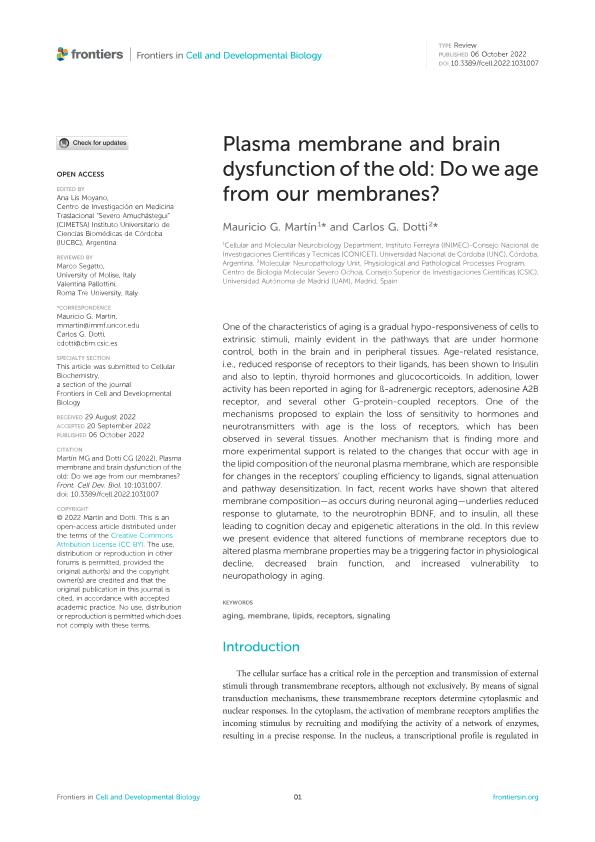Mostrar el registro sencillo del ítem
dc.contributor.author
Martín, Mauricio Gerardo

dc.contributor.author
Dotti, Carlos

dc.date.available
2023-08-17T10:49:19Z
dc.date.issued
2022-10-06
dc.identifier.citation
Martín, Mauricio Gerardo; Dotti, Carlos; Plasma membrane and brain dysfunction of the old: Do we age from our membranes?; Frontiers Media; Frontiers in Cell and Developmental Biology; 10; 6-10-2022; 1-18
dc.identifier.issn
2296-634X
dc.identifier.uri
http://hdl.handle.net/11336/208554
dc.description.abstract
One of the characteristics of aging is a gradual hypo-responsiveness of cells to extrinsic stimuli, mainly evident in the pathways that are under hormone control, both in the brain and in peripheral tissues. Age-related resistance, i.e., reduced response of receptors to their ligands, has been shown to Insulin and also to leptin, thyroid hormones and glucocorticoids. In addition, lower activity has been reported in aging for ß-adrenergic receptors, adenosine A2B receptor, and several other G-protein-coupled receptors. One of the mechanisms proposed to explain the loss of sensitivity to hormones and neurotransmitters with age is the loss of receptors, which has been observed in several tissues. Another mechanism that is finding more and more experimental support is related to the changes that occur with age in the lipid composition of the neuronal plasma membrane, which are responsible for changes in the receptors’ coupling efficiency to ligands, signal attenuation and pathway desensitization. In fact, recent works have shown that altered membrane composition—as occurs during neuronal aging—underlies reduced response to glutamate, to the neurotrophin BDNF, and to insulin, all these leading to cognition decay and epigenetic alterations in the old. In this review we present evidence that altered functions of membrane receptors due to altered plasma membrane properties may be a triggering factor in physiological decline, decreased brain function, and increased vulnerability to neuropathology in aging.
dc.format
application/pdf
dc.language.iso
eng
dc.publisher
Frontiers Media

dc.rights
info:eu-repo/semantics/openAccess
dc.rights.uri
https://creativecommons.org/licenses/by-nc-sa/2.5/ar/
dc.subject
AGING
dc.subject
LIPIDS
dc.subject
MEMBRANE
dc.subject
RECEPTORS
dc.subject
SIGNALING
dc.subject.classification
Bioquímica y Biología Molecular

dc.subject.classification
Ciencias Biológicas

dc.subject.classification
CIENCIAS NATURALES Y EXACTAS

dc.title
Plasma membrane and brain dysfunction of the old: Do we age from our membranes?
dc.type
info:eu-repo/semantics/article
dc.type
info:ar-repo/semantics/artículo
dc.type
info:eu-repo/semantics/publishedVersion
dc.date.updated
2023-07-04T10:59:19Z
dc.journal.volume
10
dc.journal.pagination
1-18
dc.journal.pais
Suiza

dc.description.fil
Fil: Martín, Mauricio Gerardo. Consejo Nacional de Investigaciones Científicas y Técnicas. Centro Científico Tecnológico Conicet - Córdoba. Instituto de Investigación Médica Mercedes y Martín Ferreyra. Universidad Nacional de Córdoba. Instituto de Investigación Médica Mercedes y Martín Ferreyra; Argentina
dc.description.fil
Fil: Dotti, Carlos. Universidad Autónoma de Madrid; España. Consejo Superior de Investigaciones Científicas; España
dc.journal.title
Frontiers in Cell and Developmental Biology
dc.relation.alternativeid
info:eu-repo/semantics/altIdentifier/doi/http://dx.doi.org/10.3389/fcell.2022.1031007
dc.relation.alternativeid
info:eu-repo/semantics/altIdentifier/url/https://www.frontiersin.org/articles/10.3389/fcell.2022.1031007/full
Archivos asociados
